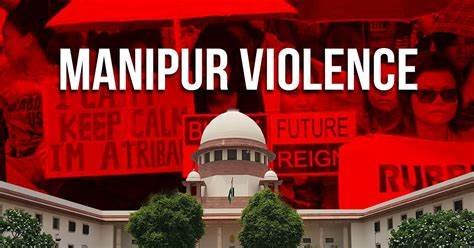Manipur, a state in northeastern India, has been grappling with ongoing ethnic violence that has intensified over the past year, leading to a dramatic escalation in tensions between the Meitei and Kuki-Zo communities. These communities have deep historical, cultural, and political divides, which have recently flared into deadly violence. The latest wave of unrest traces its roots to a ruling by the Manipur High Court, which instructed the state government to consider granting Scheduled Tribe (ST) status to the Meitei community. This ruling was met with fierce opposition from tribal groups, particularly the Kuki-Zo communities, who feared that such a move would allow Meiteis to gain access to tribal lands in the hill areas where the Kuki-Zo have historically lived.
The violence began in May 2023, when protests erupted over the court ruling, eventually escalating into a broader conflict. The Kuki-Zo, who primarily reside in the hill districts, have long feared that the Meitei, the majority population in the Imphal Valley, might seek to gain land ownership rights in their territories, which could significantly alter the demographic and economic balance of the region. The confrontation quickly turned violent, with armed groups from both sides engaging in clashes. Over 200 people have died since the violence erupted, and more than 60,000 have been displaced, with many seeking refuge in temporary shelters.
The conflict is not just about ethnic and territorial disputes, but also involves deep economic interests. The Kuki-Zo areas are rich in natural resources, including significant oil deposits, which have attracted both state and corporate interest. This has fueled concerns among the Kuki-Zo communities that the violence is not only about political autonomy but also about economic exploitation. The state government, led by the Bharatiya Janata Party (BJP), has been accused of furthering divisive policies that have exacerbated these tensions.
Moreover, the central government’s response has been criticized for being slow and insufficient. Despite the mounting violence and the heavy toll it has taken on civilian lives, the initial response from both state and national authorities was seen as inadequate, with many accusing them of prioritizing political interests over the protection of lives. The Home Minister’s recent visit to Manipur and the subsequent efforts to restore normalcy have brought some attention to the issue, but the situation remains precarious.
In addition, the violence in Manipur represents a complex interplay of ethnic, political, and economic factors. While the immediate trigger was the High Court ruling regarding the Meitei community’s demand for ST status, the conflict has revealed much deeper issues related to land ownership, resource exploitation, and the political marginalization of certain communities. The long-term resolution of the conflict will require careful attention to these underlying issues, alongside efforts to foster greater trust and cooperation among the diverse ethnic communities of Manipur.
The ongoing conflict in Manipur underscores the complexity of ethnic tensions in the region, highlighting the challenge of reconciling the diverse communities that call it home. The long-standing historical grievances, combined with socio-economic factors and political maneuvers, have exacerbated the violence, making it harder for peace to take root. The lack of trust in the state’s ability to mediate between the Meitei and Kuki-Zo communities further complicates efforts toward resolution. Local leaders and civil society groups have called for a more inclusive peace process, advocating for dialogue that addresses the grievances of all communities, while ensuring that economic exploitation and territorial rights are handled with sensitivity. As the situation continues to unfold, the international community, alongside national human rights organizations, is increasingly focused on ensuring that Manipur’s crisis is not ignored in favor of short-term political gains.


